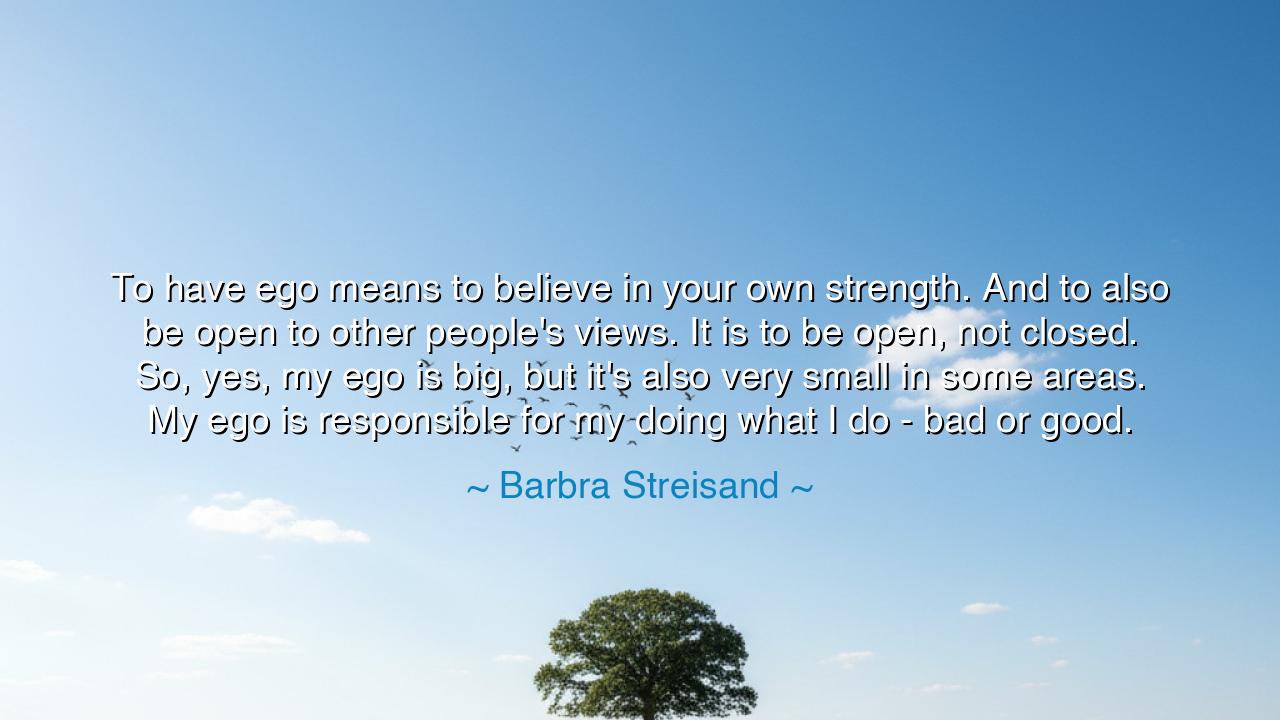
To have ego means to believe in your own strength. And to also
To have ego means to believe in your own strength. And to also be open to other people's views. It is to be open, not closed. So, yes, my ego is big, but it's also very small in some areas. My ego is responsible for my doing what I do - bad or good.






The voice of Barbra Streisand, one of the greatest artists of her age, speaks not only of music but of the ancient struggle within the human soul. She declared: “To have ego means to believe in your own strength. And to also be open to other people's views. It is to be open, not closed. So, yes, my ego is big, but it's also very small in some areas. My ego is responsible for my doing what I do — bad or good.” In this confession lies a paradox, a wisdom that echoes from the philosophers of old to the seekers of today. For the ego, often maligned as pride or arrogance, is not only a shadow but also a flame. It can consume, yet it can also guide.
To possess an ego is to possess the will to act. Without it, one drifts like a leaf in the wind, surrendering one’s destiny to the tides of circumstance. The ego is the belief in one’s own strength, the unshakable faith that one’s voice, one’s work, one’s being matters. It is the spark that compels the artist to create, the warrior to rise, the thinker to question. In Streisand’s words, the ego is not a closed fortress but a gate — it must stand strong enough to guard self-belief, yet open enough to let in the wisdom of others.
Consider the life of Alexander the Great. His ego was immense; he believed himself destined to conquer the world. It gave him the courage to lead armies across deserts and mountains, to defeat empires far greater than his own. Yet, at times, he listened to his generals, his philosophers, and his men, and in those moments his greatness was not only his own but multiplied by their strength. When he forgot this openness, when his ego became a cage, his empire cracked beneath its own weight. Thus we learn: the ego is both blessing and danger, light and shadow.
Streisand’s words remind us that the ego is not evil in itself. It is a force, a double-edged sword, capable of shaping both good and bad. Without her own belief in her voice — in her right to stand before the world and sing — Streisand might never have risen from obscurity. Her ego was the root of her courage, the reason she could endure criticism, rejection, and the weight of fame. Yet she admits too that it is small in some areas, a recognition that no one’s spirit is complete without humility.
The ancients would call this balance the golden mean — to walk the line between arrogance and self-doubt. The ego must be nurtured, for without it, one cannot build, create, or overcome. But it must also be tempered, for when it grows too large, it blinds us to truth, isolates us from others, and destroys what it once helped us achieve. Streisand’s wisdom is not that the ego must be destroyed, but that it must be shaped, trained, and guided, like fire in the hearth.
The lesson here is profound: Do not despise your ego, for it is the foundation of your strength. Believe in yourself. Speak with confidence. Create boldly. But also temper that belief with openness. Listen to others, for their eyes may see what yours cannot. Accept criticism not as an attack but as a torch to light your path. When your ego tells you that you can, let it give you courage. When it whispers that you are always right, let humility remind you to pause.
And so, O listener, carry this wisdom forward. Nurture your ego, for it is the root of action. Keep it strong enough to shield you from despair, but humble enough to let in the voices of others. Let it drive you to greatness, but never let it chain you to pride. For as Streisand teaches, the ego is responsible for what we do — bad or good. Let yours, then, be the companion that guides you toward deeds that uplift, that endure, and that shine like the stars.
Thus remember: the ego is neither your enemy nor your master, but your instrument. Wield it well, and your life shall echo with the harmony of strength and wisdom, a song fit to be passed down through generations.






AAdministratorAdministrator
Welcome, honored guests. Please leave a comment, we will respond soon